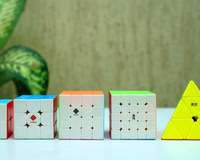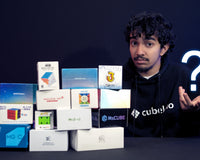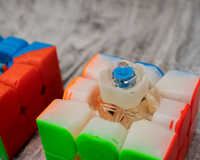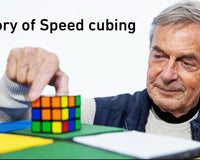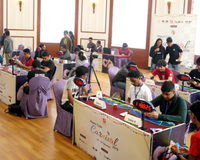What are Sum of Ranks and KinchRanks?
SOR refers to “Sum of Ranks” which is a method used to calculate the skill of a cuber across all 17 WCA events (earlier 18). Another alternative to do the same is the “Kinch Ranks” method. Both of these methods have their advantages and disadvantages but the WCA officially lists only the SOR rankings. A lot of cubers prefer the Kinch ranks because it gives equal importance to all the WCA events rather than favoring someone that is only good at a few main events. I rank first in India for the “Average” SOR statistic and am top 20 in Asia too so I have had my share of experience in this field. All of us have at some point or the other picked a main event or two and practiced them while ignoring all the other events. There are multiple reasons we cubers do this - maybe they want to achieve their first podium, maybe there are only a limited set of events that are organized at competitions they attend or maybe they simply enjoy those events. Earlier this bias towards a few events was more due to lack of good hardware in events like 6x6, 7x7, Square-1 or Clock but now I can safely say that all events have good cubes out there that don’t limit your speed much. For now, our goal is to minimize this bias and to practice and improve at all the events somewhat equally.

Kinch Rankings of Indian Speedcubers
So what can I do to improve my SOR?
There are a lot of methods to approach this goal. You may or may not follow the following tips in order -
- Get a result in ALL events - By this I am referring to all 17 events. If you want to improve your SOR/Kinch then practicing all events is extremely beneficial. A lot of people struggle with blindfolded events due to continuous failures. Don’t worry about this since a lot of people (including me) take multiple competitions to achieve just a single successful solve. Apart from these, the speed solving events are pretty fun to learn at first since improvement comes almost effortlessly and getting your solves under the competition’s cutoff is just a matter of practice especially for larger events.
- Don’t get too stuck up on your main event - Unless you’re preparing for a huge competition or record, I’d suggest that you practice at least 3 events apart from your main event at all times. This helps in keeping in touch with those events and prevents you from forgetting important algorithms and techniques. Of course, keep switching up these events too. Also just buy good cubes of different events rather than being a 30 second 3x3 solver that owns literally every Gan cube out there.

Big Cubes - 5x5x5, 6x6x6, 7x7x7
- Group a few events together and grind them - This is in my opinion the most important tip for top solvers. There have been a lot of world class cubers that were just decent at some events, took a break from their main event, grinded a set of events and then came back and destroyed NRs/CRs/WRs at those events. This happens because they know the proper procedure to improve at any event regardless of their past experience in that event and more importantly, they have skills from some cubes that they can blindly apply to other events. A quick example would be a top 2x2 solver focusing on 3x3 and improving by a lot solely due to their really fast turning speed.
So what are the different groups you could form?
Firstly, the most obvious groups are the big cubes - 4x4,5x5,6x6,7x7. Next would be the blindfolded events - 3BLD, 4BLD, 5BLD and MBLD. After this the other events could be clubbed in a lot of various ways. For me these are the side events (Megaminx, Pyraminx, Skewb, Square-1 and Clock) and then 3x3 and the other events that I barely practice like 2x2, 3x3 OH and FMC. I advise you to create your own groups depending on what events you would like to improve at like you could make a group of only short events or 3x3 events, longer events, etc. The point here is that you focus on a specific group and go deeper into the techniques, you solutions, learn algorithms and observe overall improvement in all events of that group.
- Worst event First - By “worst” I am not referring to an event you hate and would like to see out of the WCA like Clock or 5BLD for me, I am referring to the event you think you are comparatively the slowest at. In order to do this you can compare your rankings in those events in the nation, continent, world ,etc. I remember that in my case, my weak points were OH, the big cubes and BLD events. I was always comparatively faster at the side events so I set them aside for a while. You could set a goal based on your 3x3 speed or rankings of your other events. For example I set my goal as NR top 100 in every event. The important part is that you practice your worst ranked/weakest event until you achieve that goal. After this switch up to your second slowest event and so on. Also keep making these goals harder like I personally reduced this 100 down to top 25 at the moment.
If you’re an intermediate cuber then this will help you a lot since you are reducing your gap between the events and after you are around the same rank in almost all events you can go ahead and start practicing events in groups to see steady improvement as described above.

Sum of Ranks (SOR) Average Rankings of Indian Speedcubers
If you’ve made it this far then you are probably already motivated to improve your SOR, that is if competitions have started around your region :(
In case you still don’t have this motivation then don’t worry, it will happen naturally when you hit a barrier in some events. In fact, you don’t HAVE to improve your SOR. As long as you’re enjoying speedcubing and competitions as a whole you don’t need to focus on a lot of events. Of course there are people like me that do it for fun and like to observe improvement in events where it is easy. I also get bored of events extremely quickly. A lot of people just practice SOR to be a well rounded speedcuber and improving one event might help you improve at another even if they’re not at all related. Most competitions here in India hand out prizes to the top overall cubers so that could be an incentive to improve your SOR now. On the other hand most professional cubers that hold world records in few events are just about average at other events. Max Park has only competed in 8 events officially, a lot of fast blindsolvers are never able to compete in speed events at a higher level and a lot of 3x3 solvers only do 3x3. In the end although I would recommend improving your SOR, there’s no pressure to do so. Just make sure you get a taste of every event because who knows, maybe you could be secretly talented at an event you’ve never touched.
About Author

Nikhil Soares
Nikhil Soares is the current Megaminx (Single and Average both) and 2x2 (Single) National record holder from Mumbai. He started cubing at the age of 10 and has been cubing for the past 7 years now. Other than cubing he loves to play drums and video games. He became the Megaminx Asian Champion in 2018 at the age of 13. He has also broken 2 Guinness World Records. He has participated in 56 competitions and won a total of 173 podiums with 58 gold medals and 21 National Records. He also has a World Ranking of 30 in 2x2 Single, 17 in Megaminx Single, and 25 in Megaminx Average.

















